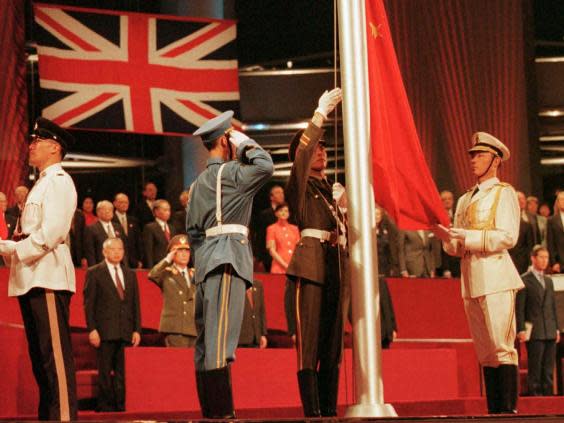China threatens ‘countermeasures’ after UK said it could offer Hong Kong residents path to British citizenship

China has responded with indignation to criticism of its proposed new Hong Kong security laws, threatening “countermeasures” after the UK indicated it could offer citizenship to 300,000 residents of the former British colony.
The Chinese parliament has approved plans to move forward with sweeping new anti-sedition legislation, which activists, diplomats and businesses fear will jeopardise Hong Kong’s semi-autonomous status and its role as a global financial hub.
The UK, the US, Australia and Canada condemned the move on Thursday, with the British foreign secretary, Dominic Raab, urging Beijing to “step back from the brink”.
Mr Raab said the UK would allow the approximately 300,000 people in Hong Kong who hold British national (overseas) passports to stay in the UK for 12 months, instead of the current six, unless China scraps the proposed law.
Allowing BN(O) passport holders to apply to work and study for extendable periods of 12 months would “provide a pathway to future citizenship”, Mr Raab added, although he appeared to stop short of pledging definite right of abode.
Police waited in vans outside the mall but did not attempt to break up the gathering. Hundreds of people have been arrested during recent demonstrations aimed at reviving the momentum of the protests that shut down large parts of the city during the second half of last year.
Hong Kong’s autonomy was guaranteed under the “one country, two systems” agreement enshrined in the 1984 Sino-British Joint Declaration, signed by the then Chinese premier, Zhao Ziyang, and the British prime minister, Margaret Thatcher.

Chris Patten, the last British governor of Hong Kong, said this week: “What has changed is [current Chinese president] Xi Jinping; Xi Jinping is a very different sort of dictator and he is one who wants to export what he thinks is China’s power.”
Hong Kong was rocked by months of pro-democracy demonstrations last year over an unsuccessful bid to introduce a law governing extradition to China.
China says its proposed legislation will aim to tackle secession, subversion, terrorism and foreign interference in the city, but the plan, which was announced in Beijing last week, triggered the first big protests in Hong Kong for months.
Donald Trump’s administration has warned it could withdraw special privileges afforded to Hong Kong under US law on the basis of its high degree of autonomy from Beijing.
The US state department said it could “no longer certify that Hong Kong continues to warrant [differential] treatment” from China.
Mr Zhao accused Washington of interfering in China’s internal affairs and said Beijing would take any necessary countermeasures.
Additional reporting by agencies
Read more
UK threatens to offer citizenship bids to 300,000 Hong Kong residents
Chinese parliament votes to approve controversial Hong Kong law
Trump administration says Hong Kong no longer independent from China

